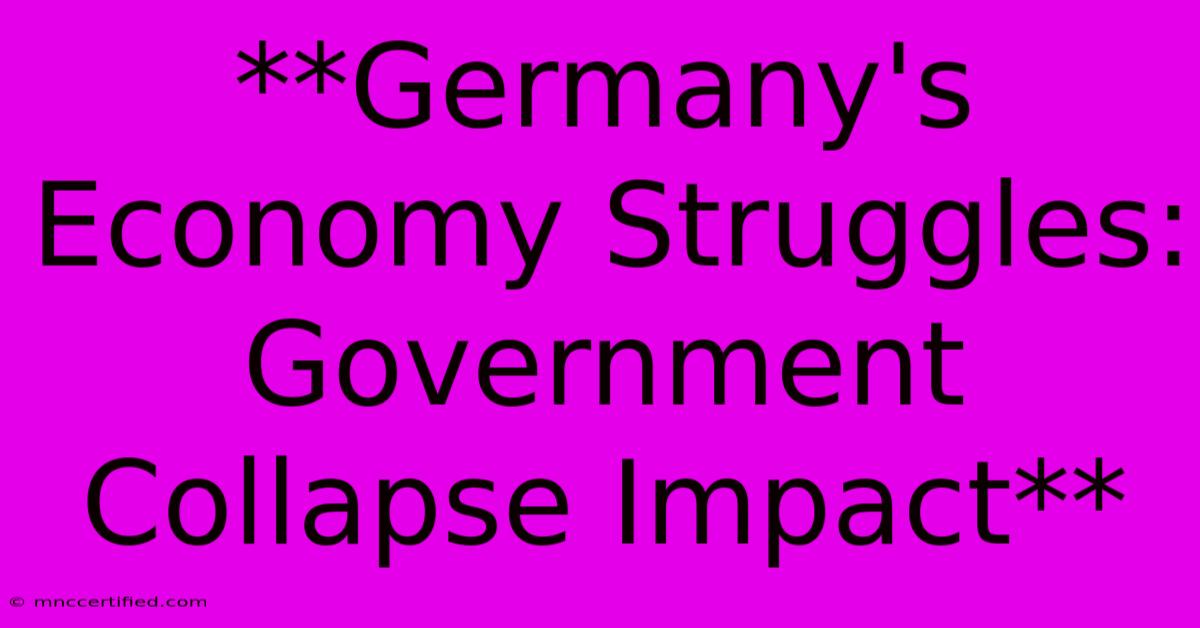**Germany's Economy Struggles: Government Collapse Impact**

Table of Contents
Germany's Economy Struggles: The Impact of a Potential Government Collapse
Germany, known for its economic stability and robust manufacturing sector, is facing a challenging period. The country's economy is grappling with inflation, rising energy prices, and a slowing global economy. The situation has been further complicated by the ongoing political uncertainty, with a potential government collapse looming. This article will explore the potential impact of a government collapse on Germany's economy, examining the key challenges and possible scenarios.
The Current Economic Landscape: A Perfect Storm
Germany's economic woes are a result of a complex interplay of factors:
- Inflation: The war in Ukraine and supply chain disruptions have led to surging inflation, hitting German consumers hard.
- Energy Crisis: Germany's reliance on Russian energy has made it particularly vulnerable to the energy crisis. The rising cost of gas and oil is impacting businesses and households alike.
- Global Slowdown: The global economy is slowing down, impacting Germany's export-oriented industries.
- Declining Consumer Confidence: The combination of inflation and rising energy prices has led to a decline in consumer confidence, impacting spending.
A Potential Government Collapse: Adding to the Uncertainty
The ongoing political instability adds a new dimension to Germany's economic challenges. A potential government collapse could:
- Delay Critical Economic Policies: A new government would need time to form and establish its policies, potentially delaying much-needed economic reforms.
- Create Market Volatility: Political uncertainty can create market volatility, making it difficult for businesses to invest and plan for the future.
- Hinder International Cooperation: A lack of a stable government could make it harder for Germany to work with its international partners on addressing global economic challenges.
Possible Scenarios and their Impact
Depending on the political outcome and the actions taken by the next government, the impact of a government collapse could range from moderate to severe:
- Scenario 1: A Quick and Stable Government Formation: If a new government is formed quickly and with a clear mandate, the economic impact could be minimal. However, the uncertainty during the transition period might still impact business confidence.
- Scenario 2: Prolonged Political Instability: If the formation of a new government is delayed or unstable, the economic consequences could be more severe. This could lead to a prolonged period of uncertainty, making it difficult for businesses to plan and invest.
- Scenario 3: Significant Policy Changes: If the new government introduces major policy changes, such as increased spending or tax increases, this could have a significant impact on the economy.
The Path Forward: Navigating the Challenges
Germany faces a complex economic situation, but it also has the resources and resilience to overcome these challenges. The key will be:
- Stabilizing the Political Landscape: A stable and cohesive government is crucial for addressing the economic challenges ahead.
- Implementing Targeted Economic Measures: The new government needs to implement targeted policies to support businesses and consumers, such as tax breaks, subsidies, and investment in renewable energy.
- Strengthening International Cooperation: Germany needs to work closely with its international partners to address global economic challenges and secure energy supplies.
Conclusion
Germany's economic future is intertwined with the outcome of its political situation. While a government collapse would add to the existing challenges, the country's economic strength and resilience provide hope for navigating the turbulent waters ahead. It is crucial for Germany to prioritize stability, implement targeted economic measures, and strengthen international cooperation to emerge from these challenging times.

Thank you for visiting our website wich cover about **Germany's Economy Struggles: Government Collapse Impact**. We hope the information provided has been useful to you. Feel free to contact us if you have any questions or need further assistance. See you next time and dont miss to bookmark.
Featured Posts
-
Kimmel Tears Up Over Trump Victory
Nov 08, 2024
-
Insurance For Board Members Of Nonprofit
Nov 08, 2024
-
Cincinnati Insurance Company Naic Number
Nov 08, 2024
-
North Korean Troops In Russia Access Porn
Nov 08, 2024
-
Home Insurance Adjuster Estimate Too Low
Nov 08, 2024